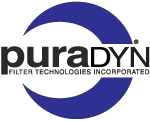Why a bypass filter is needed and why puraDYN is your best choice
60% of engine wear is caused by particles sized between 5-20 microns, but most OEM full-flow filters only perform efficiently at 15-40 microns. Without a bypass oil filter, increased engine wear can occur when particulate matter under 15 microns is not trapped by the full flow filter. puraDYN bypass filters capture particulate even smaller than 1 micron.
Without a bypass filter, oil becomes dirty much faster – accelerating engine wear and requiring it to be changed more frequently.
- The puraDYN bypass oil filtration system does not affect the engine’s oil flow or pressure.
- The puraDYN system does not replace the conventional full-flow filter – it works in conjunction with it to enhance micro-fine filtration
Why puraDYN is better than centrifugal filters ("spinners") and other bypass systems:
- Only puraDYN offers our patented Polydry® polymer system to remove and absorb water from your oil
- Only puraDYN replenishes key additives to maintain your oil's chemical balance and viscosity
- puraDYN systems have no moving parts and don't require regular, manual cleaning of components
What impact does using puraDYN have on my equipment?
It keeps your engine running on continuously clean oil, which can:
- Extend engine life from 25% to nearly 200%, and mid-cycle top-end overhauls may be delayed or even skipped
- Reduce oil changes by up to 90%
- Up to 90% less oil purchased and stored
- Reduced cost and environmental risk of waste oil storage and disposal
What are the potential consequences of not using the puraDYN System?
Following are examples of common contaminants that are not filtered out below 5 microns by a standard OEM filter and what the effects of these contaminants can have on your equipment:
| Common Contaminants: | Effects of Contamination |
| Engines: | |
These common contaminants:
|
Can lead to:
|
| Transmissions: | |
These common contaminants:
|
Can lead to:
|
| Hydraulics: | |
These common contaminants:
|
Can lead to:
|
Company Commitment
- 30+ Years in the Bypass Oil Filtration Business
- Will Not Void Manufacturer's Warranty
- ISO 9001 Certified
We Back Our Product
- Five-Year Unlimited Miles/Hours Warranty on Unit
- Six-Month Money Back Guarantee
- Insured Up to $5M per Occurrence Liability Coverage


